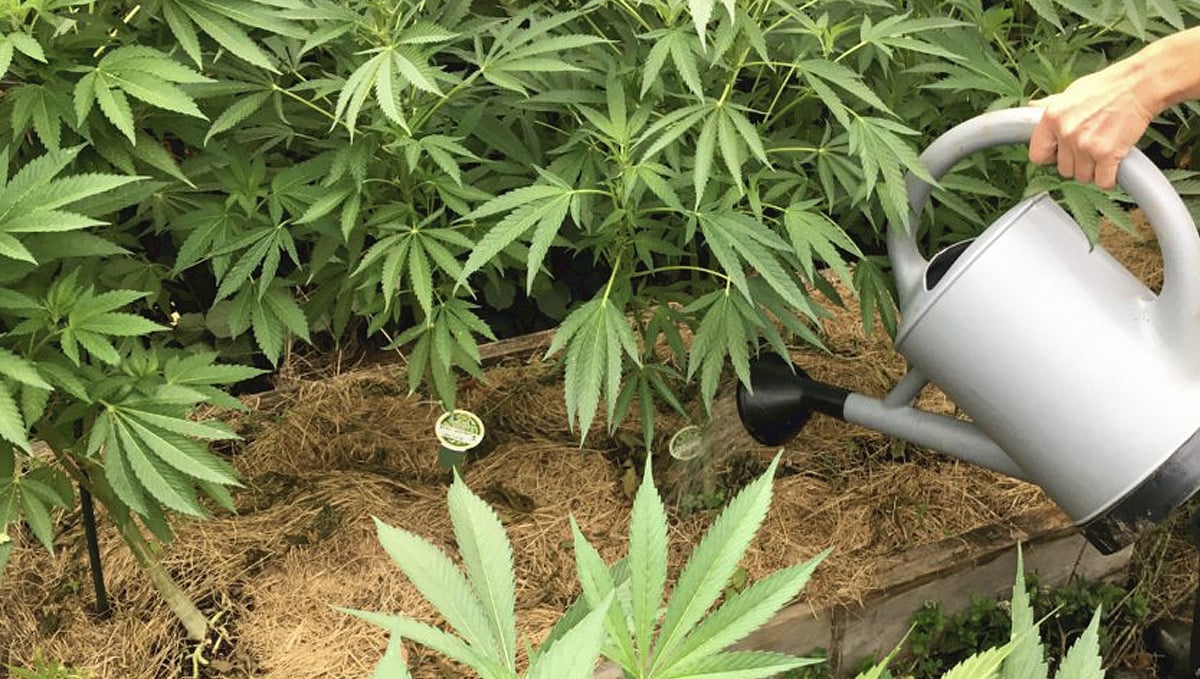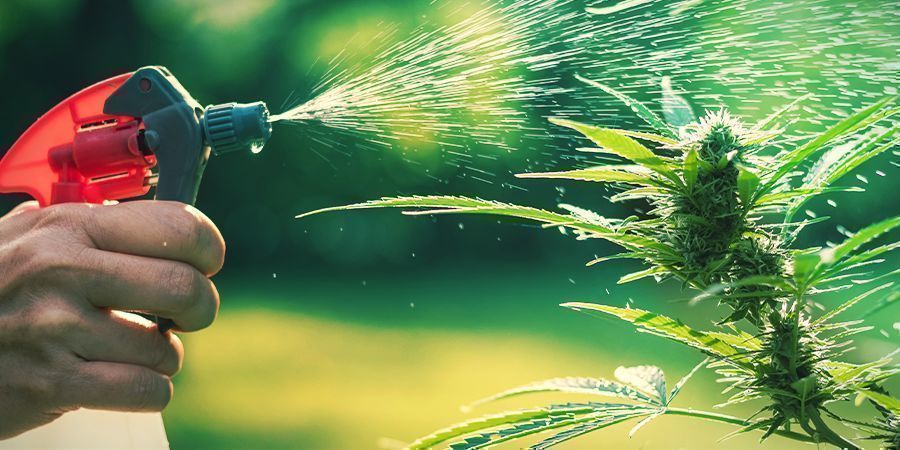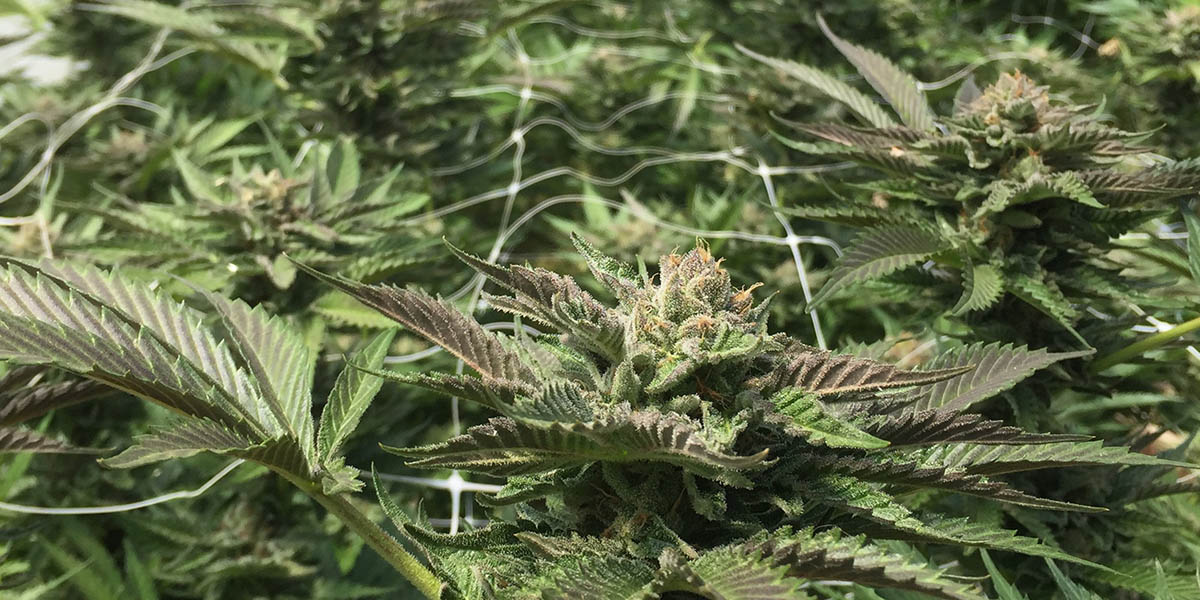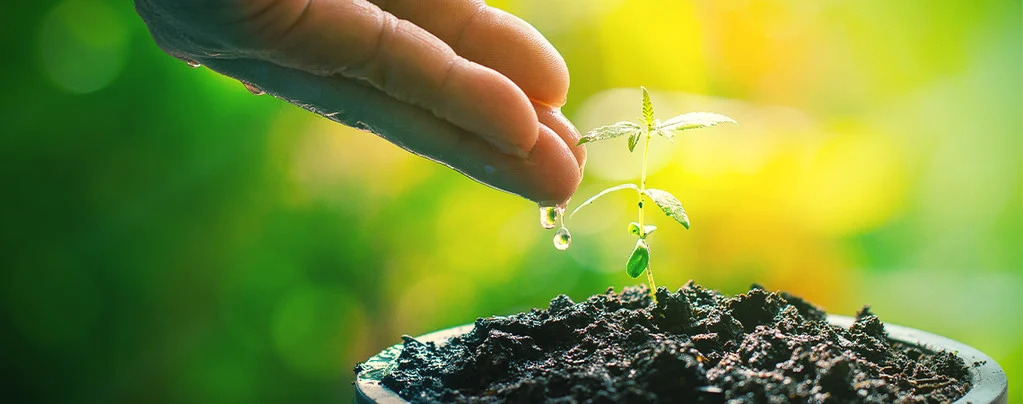Qu'est-ce qu'un thé de compost pour les plantes de cannabis?
Le thé de compost est un engrais liquide organique qui peut être utilisé pour fournir des nutriments essentiels aux plantes de cannabis. Il est fabriqué en trempant un sac de compost dans un seau d’eau, permettant aux nutriments et aux organismes du compost de s’infiltrer dans l’eau. Les seaux à compost peuvent fournir non seulement des nutriments végétaux bénéfiques tels que l'azote, le phosphore et le potassium, mais également des bactéries et des champignons utiles qui contribuent à améliorer la santé de votre sol.
Le thé de compost est particulièrement bénéfique pour les plantes de cannabis car il aide à décomposer les sels accumulés dans le sol qui seraient autrement toxiques pour le cannabis. En fin de compte, cela fait du thé une méthode simple et efficace pour nourrir et nourrir votre jardin de cannabis sans recourir à des engrais synthétiques agressifs.
Pourquoi le thé de compost est-il bénéfique pour vos plants de cannabis ?
Le thé de compost est récemment devenu un engrais populaire pour les cultivateurs de cannabis, introduisant des nutriments essentiels, des bactéries bénéfiques et des champignons qui peuvent être utilisés à bon escient lorsqu'ils sont appliqués directement sur le sol ou utilisés pour pulvériser les feuilles des plantes. Des études ont montré les effets positifs remarquables de l’utilisation du thé de compost, éclipsant les opposants qui affirment qu’il n’apporte aucun bénéfice.
Les principaux avantages du thé de compost sont de nourrir les micro-organismes nécessaires au maintien d’un sol sain et d’augmenter les rendements des plantes tout en renforçant le système immunitaire des cultures de cannabis. Les praticiens signalent une amélioration des rendements et une plus grande résistance des cultures après avoir pulvérisé sur leurs plantes des solutions de thé de compost, grâce aux organismes bénéfiques présents dans la solution qui supplantent les organismes nuisibles pour l'espace dans le sol.
De plus, le compost offre également plusieurs oligo-éléments importants, essentiels à une santé optimale dans le cannabis, tels que le fer et le calcium – deux éléments généralement difficiles à obtenir à partir d’autres sources mais essentiels à un régime alimentaire équilibré.
À Lire Plus: Comment obtenir de gros rendements de cannabis en extérieur
Améliore la croissance des plantes
Le thé de compost peut être bénéfique pour les plantes de cannabis car il leur fournit des nutriments essentiels et des micro-organismes qui peuvent favoriser une croissance saine. Il est obtenu en trempant du compost organique dans de l'eau propre et en le laissant fermenter pendant une certaine période. Les nutriments liquides qui en résultent contiennent des bactéries bénéfiques, des champignons et d’autres micro-organismes actifs qui peuvent contribuer à améliorer la santé du sol et les hormones de croissance des plantes.
Lorsqu'il est appliqué sur le sol ou pulvérisé directement sur les feuilles des plantes, il peut aider à améliorer le développement des racines, à augmenter la résistance aux maladies et aux ravageurs et à améliorer la santé globale des plantes. Cependant, il est important de noter que la qualité du compost organique utilisé dans le thé aura un impact significatif sur son efficacité. Il est également important de s'assurer que le thé est infusé correctement et utilisé dans un court laps de temps, car il peut être contaminé s'il fermente trop longtemps.
Introduit des micro-organismes bénéfiques
Le thé de compost est connu pour sa capacité à introduire des micro-organismes bénéfiques dans le sol, ce qui peut aider à décomposer la matière organique et à rendre les nutriments essentiels plus disponibles pour les racines des plantes. Cela peut à son tour améliorer la structure du sol et la rétention des sources d’eau, ainsi que supprimer les agents pathogènes nocifs qui peuvent causer des maladies chez les plantes de cannabis.
De plus, ces micro-organismes actifs bénéfiques peuvent être directement appliqués sur les feuilles d’une plante de cannabis, améliorant ainsi la santé et la croissance globales tout en réduisant le besoin de produits chimiques synthétiques comme les pesticides et les fongicides.
Élimine le besoin de produits chimiques toxiques
Le thé de compost peut être une alternative bénéfique à l’utilisation d’engrais synthétiques et de produits chimiques toxiques en agriculture. En fournissant au sol des nutriments essentiels et des micro-organismes bénéfiques, il peut contribuer à favoriser une croissance saine des plantes et à supprimer les agents pathogènes nocifs. Cela peut réduire le besoin d’engrais chimiques et de pesticides, qui peuvent avoir des effets nocifs sur l’environnement et la santé humaine.
Les engrais chimiques peuvent modifier l’équilibre des éléments nutritifs dans le sol, entraînant sa dégradation et sa santé réduite au fil du temps. Ils peuvent également s’infiltrer dans les eaux souterraines, provoquant une pollution et des dommages aux écosystèmes aquatiques. Les pesticides, en revanche, peuvent être toxiques pour les insectes utiles et autres animaux sauvages, ainsi que pour les humains et les animaux de compagnie qui entrent en contact avec eux.
En revanche, le thé de compost est une alternative naturelle et biologique qui peut aider à favoriser une croissance saine des sols et des plantes tout en réduisant le besoin de produits chimiques synthétiques. La promotion d’un microbiome du sol sain peut aider à supprimer les agents pathogènes nocifs, à réduire la pression des ravageurs et des maladies et à promouvoir la santé globale des plantes. Cela peut aboutir à une agriculture plus saine et plus durable, avec une dépendance réduite aux produits chimiques synthétiques et un impact plus positif sur l’environnement et la santé humaine.
L'utilisation du thé de compost pour nourrir vos plants de cannabis
L’utiliser pour nourrir vos plants de cannabis peut être un excellent moyen de fournir des nutriments essentiels et des micro-organismes bénéfiques au sol et aux feuilles. Voici quelques étapes que vous pouvez suivre pour préparer et utiliser du thé de compost pour vos plants de cannabis :
Préparez le thé de compost : Commencez par sélectionner un compost de haute qualité, tel qu'un compost mature fabriqué à partir d'une variété de matières organiques. Remplissez un récipient d'eau, ajoutez le compost et laissez infuser 24 à 48 heures en remuant de temps en temps.
Filtrer le thé : Après l'infusion, filtrez le thé de compost à travers un tamis à mailles fines pour éliminer toutes les particules solides.
Appliquer le thé : Le thé de compost peut être appliqué sur le sol autour des racines de vos plants de cannabis ou pulvérisé directement sur les feuilles. Il est préférable d'utiliser le thé quelques heures après avoir infusé le thé de compost, car il peut être contaminé s'il est laissé trop longtemps.
Répétez au besoin : Répétez le processus de préparation et d’application du thé au besoin, en fonction du stade de croissance de vos plantes d’extérieur et des besoins spécifiques de votre sol.
En l’utilisant pour nourrir vos plants de cannabis, vous pouvez fournir des nutriments essentiels et des micro-organismes bénéfiques qui peuvent favoriser une croissance saine et supprimer les agents pathogènes nocifs.
Comprendre les différents types de thé de compost
Il existe plusieurs types de thé de compost, chacun avec sa composition et ses avantages uniques. Certains des types de thé de compost les plus courants comprennent :
Thé aéré (ACT) : L'ACT est un type de thé de compost aéré à l'aide d'une pompe à air pour fournir de l'oxygène aux micro-organismes contenus dans le thé. Ce type de thé de compost est conçu pour favoriser la croissance de bactéries et de champignons bénéfiques dans le thé.
Thé non aéré (UCT) : L'UCT est un type de thé de compost qui n'est pas aéré, s'appuyant plutôt sur des processus naturels pour fournir de l'oxygène aux micro-organismes présents dans le thé. Ce type de thé est conçu pour favoriser la croissance de bactéries et de champignons bénéfiques dans le sol.
Thé de vers aéré : Le thé de vers aéré est un type de thé de compost fabriqué à partir de lombricompost (compost à base de vers) au lieu du compost traditionnel. Ce type de thé est riche en bactéries et champignons bénéfiques, ainsi qu’en turricules de vers, qui sont un engrais naturel.
Thé à dominante fongique : Le thé à dominante fongique est un type de thé de compost conçu pour favoriser la croissance de champignons bénéfiques dans le sol. Ce type de thé est fabriqué à partir de compost riche en biomasse fongique et aéré pour favoriser la croissance des champignons.
Thé à dominante bactérienne : Le thé à dominante bactérienne est un type de thé de compost conçu pour favoriser la croissance de bactéries bénéfiques dans le sol. Ce type de thé est fabriqué à partir de compost riche en biomasse bactérienne nocive et aéré pour favoriser la croissance des mauvaises bactéries.
Chaque type de thé de compost a sa composition et ses avantages uniques, et le meilleur type de thé pour vos plants de cannabis dépendra des besoins spécifiques de votre sol et du stade de croissance de la santé de vos plantes.
Ingrédients principaux du thé de compost
Le compost est l’un des principaux ingrédients du thé de compost et fournit les nutriments essentiels et les micro-organismes bénéfiques utilisés pour nourrir les plantes. Le compost est fabriqué en décomposant la matière organique, telle que les feuilles, l'herbe coupée et les restes de nourriture, en un amendement de sol riche et riche en nutriments.
Lorsqu'il est utilisé dans le thé de compost, le compost fournit des nutriments essentiels et des micro-organismes qui peuvent contribuer à améliorer la santé du sol, à favoriser la croissance des plantes et à supprimer les agents pathogènes nocifs.
Le compost peut être fabriqué à partir de diverses matières organiques et peut être acheté ou fabriqué à la maison. Il est important de choisir un compost de haute qualité pour préparer du thé de compost, car la qualité et la composition du compost auront un impact significatif sur l'efficacité du thé.
Un compost de bonne qualité doit être de couleur foncée, avoir une odeur riche et terreuse et une texture friable. Un compost trop frais ou pas suffisamment décomposé peut contenir des agents pathogènes qui peuvent être nocifs pour les plantes. Il est donc important de choisir un matériau mature et bien composté pour préparer du thé de compost.
Hydrolysat de poisson
L'hydrolysat de poisson est un type d'engrais organique qui est parfois ajouté au thé de compost pour fournir des nutriments supplémentaires aux plantes. L'hydrolysat de poisson est obtenu en décomposant les déchets ou les parties de poisson, telles que les têtes et les arêtes de poisson, sous forme liquide. Le produit obtenu est riche en azote, en phosphore et en d’autres nutriments essentiels dont les plantes ont besoin pour pousser.
Lorsqu’il est ajouté au thé de compost, l’hydrolysat de poisson peut fournir des micronutriments supplémentaires aux plantes et contribuer à favoriser une croissance saine. L'hydrolysat de poisson peut également aider à stimuler la croissance de bactéries et de champignons bénéfiques dans le thé, ce qui peut contribuer à améliorer la santé du sol et à supprimer les agents pathogènes nocifs.
Cependant, il est important d'utiliser l'hydrolysat de poisson avec prudence, car il peut avoir une odeur forte et peut ne pas convenir à tous les types de plantes ou conditions de croissance.
Compost de vers de terre "Worm Castings"
Les déjections de vers sont un type de compost qui est parfois ajouté au thé de compost pour fournir des nutriments supplémentaires et des micro-organismes bénéfiques au sol. Les déjections de vers sont des excréments de vers de terre et constituent un engrais naturel riche en nutriments essentiels, notamment l'azote, le phosphore et le potassium. Lorsqu’ils sont ajoutés au thé de compost, les déjections de vers peuvent fournir des nutriments supplémentaires aux plantes et contribuer à favoriser une croissance saine.
Les déjections de vers sont également riches en micro-organismes bénéfiques, notamment des bactéries et des champignons, qui peuvent contribuer à améliorer la santé du sol et à supprimer les agents pathogènes nocifs. Les micro-organismes contenus dans les déjections de vers peuvent aider à décomposer la matière organique du sol, rendant ainsi les nutriments essentiels plus disponibles pour les racines des plantes. De plus, les déjections de vers peuvent aider à améliorer la structure du sol et la rétention d’eau, rendant le sol plus fertile et favorisant une croissance saine des plantes.
Mélasse et Varech
La mélasse et le varech sont deux ingrédients qui sont parfois ajoutés au thé de compost pour fournir des nutriments supplémentaires et des micro-organismes bénéfiques au sol.
La mélasse est un type de sucre dérivé de la canne à sucre ou de la betterave sucrière. Lorsqu’elle est ajoutée au thé de compost, la mélasse peut fournir une nourriture supplémentaire aux micro-organismes bénéfiques présents dans le thé, contribuant ainsi à favoriser leur croissance et à améliorer la santé du sol. La mélasse peut également constituer une source de glucides, ce qui peut contribuer à améliorer la croissance des plantes.
Le varech est un type d’algue riche en nutriments essentiels, notamment l’azote, le phosphore et le potassium. Lorsqu’il est ajouté au thé de compost, le varech peut fournir des nutriments supplémentaires aux plantes et contribuer à favoriser une croissance saine. La farine de varech peut également constituer une source de micro-organismes bénéfiques, notamment des bactéries et des champignons, qui peuvent contribuer à améliorer la santé du sol et à supprimer les agents pathogènes nocifs.
Nourrissez vos plants de cannabis avec du thé
Une fois que vous avez créé votre thé de compost, vous pouvez l'utiliser pour nourrir vos plantes de cannabis de plusieurs manières différentes :
Trempage du sol : Vous pouvez utiliser le thé de compost comme trempage du sol, en l'arrosant directement sur le sol autour des racines de vos plants de cannabis. Cela fournira des nutriments essentiels et des micro-organismes bénéfiques directement aux racines, contribuant ainsi à favoriser une croissance saine et à supprimer les agents pathogènes nocifs.
Pulvérisation de feuilles : Vous pouvez également utiliser le thé de compost comme pulvérisation de feuilles, en le vaporisant directement sur les feuilles de vos plants de cannabis. Cela fournira aux feuilles des nutriments essentiels et des micro-organismes bénéfiques, contribuant ainsi à améliorer la santé et la croissance des plantes.
Alimentation foliaire : Vous pouvez également utiliser du thé de compost pour une pulvérisation foliaire, en le pulvérisant directement sur les feuilles afin de fournir des nutriments aux plantes. L’alimentation foliaire peut être un moyen efficace de fournir rapidement aux plantes des nutriments essentiels, car les feuilles peuvent absorber les nutriments directement.
Il est important d'utiliser le thé de compost quelques heures après son infusion, car il peut être contaminé s'il est laissé trop longtemps.
En Conclusion
En résumé, le thé de compost peut être un outil précieux pour les cultivateurs de cannabis qui cherchent à fournir des nutriments essentiels et des micro-organismes bénéfiques à leurs plantes. En favorisant une croissance saine des sols et des plantes, le thé de compost peut contribuer à réduire le besoin d’engrais et de pesticides synthétiques, ce qui se traduit par une agriculture plus saine et plus durable.
Chez Québec Cannabis Seeds, vous pouvez trouver une large sélection de variétés de cannabis de haute qualité, chacune avec ses caractéristiques et ses avantages uniques. En travaillant avec une banque de graines réputée, vous pouvez trouver la variété adaptée à vos besoins et vous assurer d'avoir les meilleures chances possibles de cultiver des plants de cannabis sains et robustes.


 English
English 


